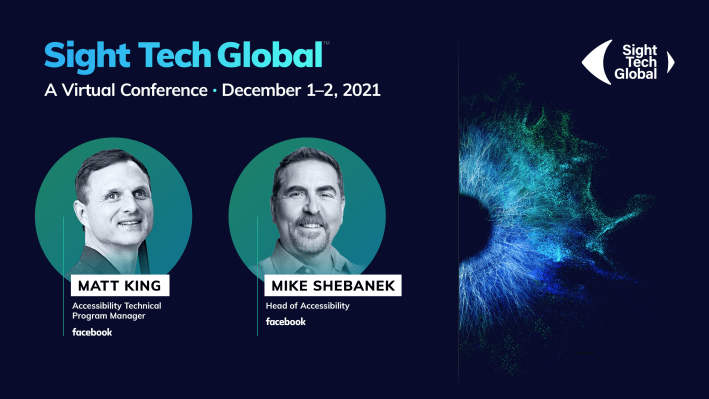Millions of people who are blind or visually impaired use a technology known as a screen reader to access the Web. However, few websites are coded to work properly with screen readers. Global web standards that specify how to support screen reader users as well as other people with disabilities have been available since 1999, but an estimated 70% of websites are still not accessible. Why is that? And more importantly, what can be done?
At Sight Tech Global (December 1-2, register today!), a free, virtual event centered on advanced technologies and accessibility for the blind and visually impaired, Facebook’s Mike Shebanek and Matt King will unfold a W3C community project years in the making that will address a huge technical limitation that has held back Web accessibility for screen readers. Be sure to join Sight Tech Global for this very important session.
To understand the technical challenge to accessibility, it’s helpful to contrast screen readers with web browsers. For more than 20 years, web developers have been building consensus on how web browsers should interpret and display web code so every web page can look and feel the same no matter which browser or device is used to view it. Companies that develop browsers and other key stakeholders in the web industry have invested heavily to create standards and build massive infrastructure that runs millions of tests every day. These tests guarantee the thousands of little coding agreements that make it possible to “write code once and then run it everywhere.” When code operates the same way in two different browsers, it is called “browser interoperability.” Browser interoperability is one of the key ingredients in the explosion of the web.
Unfortunately, there has never been a similar consensus when it comes to screen reader interoperability. People using screen readers experience the same website differently depending on which screen reader, browser and device they are using. Conversely, there is no way for developers to code and test once for all screen readers. They have to test each combination and then make difficult choices because there are many types of experiences that cannot be made to work equally well in all screen readers. So, in addition to making accessible web development expensive and needlessly frustrating, the lack of screen reader interoperability is inherently exclusionary. If you need a screen reader but don’t use one of the same screen readers that the web developer used, it is likely you will run into challenges, if not outright barriers.
The lack of interoperability for not only screen readers but all assistive technologies is one of the most significant obstacles to a more inclusive web. It is responsible for much of the inconsistency in accessibility quality, and it explains why there is so little automation to make accessibility faster and easier for developers, content creators and accessibility auditors.
Enter the W3C ARIA-AT Community Group, which has been intensely focused on solving this deeply embedded problem. The acronym stands for World Wide Web Consortium Accessible Rich Internet Application and Assistive Technology (ARIA-AT), which encompasses the standards-driving work of the W3C experts who are collaborating on the project. Facebook is underwriting the cost of the project and lending Matt King, a technical program manager for Facebook accessibility, to lead the effort.
At Sight Tech Global, Matt King will join Facebook’s Mike Shebanek and Michael Fairchild, a senior accessibility consultant at Deque Systems, to explain how the ARIA-AT project is about to make a step-change in web accessibility by building consensus around screen reader behavior expectations and developing the tests, automation technologies and testing infrastructure needed to bring screen reader interoperability to the world of web engineering.
“The ARIA-AT project is bringing to fruition a dream that has fueled years of work,” says King. “It will fundamentally change how we engineer web accessibility so it is finally practical to build experiences that are as reliable and enjoyable for assistive technology users as they are for anyone else. ARIA-AT will provide a missing cornerstone of equity for people who rely on assistive technologies.”
Sight Tech Global is a free, open and virtual event. Register today.
Mike Shebanek and Matt King need little introduction to the accessibility community. Shebanek is the head of Accessibility at Facebook and was a central player at Apple in the development of VoiceOver, the screen reader technology built into all Apple products. King is a technical program manager on Facebook’s accessibility team and previously led enterprise accessibility at IBM. Joining them on the main stage will be Michael Fairchild, who co-chairs the W3C ARIA-AT Community Group along with King, and works as a senior accessibility consultant at Deque Systems.
Given the importance of the ARIA-AT project to the accessibility industry and community, as well as the technical depth involved, the Sight Tech Global team decided to add a breakout session to go deeper into the project and its impact on the future of digital accessibility.
The breakout will dig into the technical details of ARIA-AT; speakers will include King and Fairchild, as well as Sina Bahram, founder of Prime Access Consulting and Jes Daigle, engineering manager at Bocoup.
The breakout session will be live and attendees will be able to ask questions through a moderator.
Sight Tech Global is a production of the Vista Center for the Blind and Visually Impaired. We are grateful to current sponsors Ford, Yahoo, Google, Humanware, Microsoft, Mojo Vision, Facebook, WordPress and Vispero. If you would like to sponsor the event, please contact us. All sponsorship revenues go to the nonprofit Vista Center for the Blind and Visually Impaired, which has been serving the Silicon Valley area for 75 years.
Please register for Sight Tech Global. The event is virtual and free, December 1 and 2 from 8 a.m. to 12 p.m. Pacific Time.
